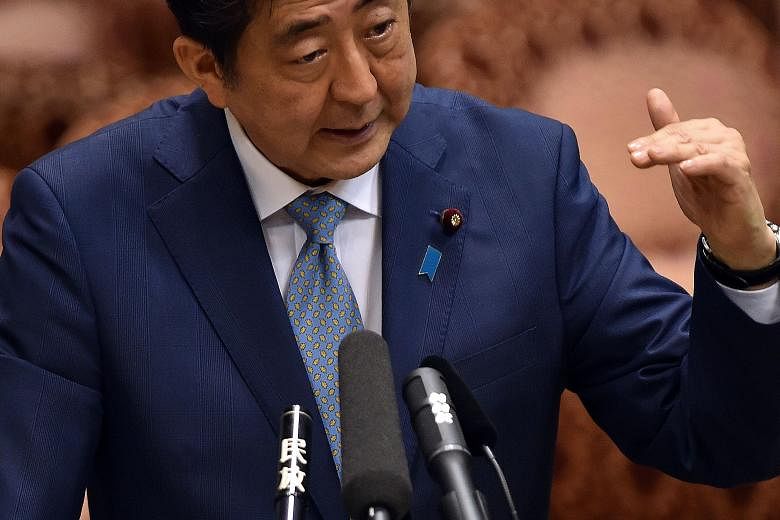TOKYO • A draft of Japanese Prime Minister Shinzo Abe's statement to mark the 70th anniversary of the end of World War II includes the word "apology", a report said yesterday, in a possible concession to China and South Korea.
The news came as support for Mr Abe slipped to just over 30 per cent and the country is due to switch on a nuclear reactor for the first time in nearly two years today amid public scepticism, a poll by the Mainichi newspaper showed yesterday.
Mr Abe's speech - expected on Friday - will be carefully scrutinised by Japan's neighbours, who are waiting to see if he repeats earlier Japanese apologies for its 20th-century militarism.
Public broadcaster NHK said an original draft of Mr Abe's statement included the words "apology" and "aggression".
Those words appear in a landmark 1995 statement by then Premier Tomiichi Murayama, who expressed "deep remorse" and a "heartfelt apology" over Japan's actions. The so-called Murayama Statement said Japan "through its colonial rule and aggression, caused tremendous damage and suffering to the people of many countries, particularly to those of Asian nations".
Also, the right-leaning Sankei newspaper said yesterday that Mr Abe would likely use the word "aggression", though not necessarily linking it to Japan's wartime actions. "It is likely that he will touch on (aggression) as a universally unforgivable act," the paper said.
Mr Abe's statement is expected a day before Aug 15, the date Japan surrendered to the Allies in 1945.
The nationalist Premier - who has been criticised by some for playing down Japan's wartime record and trying to expand the role of the military - said last week that he would express "remorse" over the war. He added that he would follow previous explicit prime ministerial apologies over the country's past "as a whole".
But Mr Abe has repeatedly talked of the need for what he calls a "forward-looking attitude" that concentrates on the positive role Japan has played - and continues to play - in Asia since its surrender in 1945.
That has set alarm bells ringing in China and Korea, which suffered under Japan's imperial expansion and are angered by any move to tone down apologies by previous leaders.
Mr Abe - whose popularity has plunged to 32 per cent, the lowest since his return to office in December 2012 - was treading a fine line, trying to please his right-wing base but also avoid being accused of picking a diplomatic fight, said political science professor Koichi Nakano of Sophia University.
Mr Abe's pursuit of restarting the country's unpopular nuclear power programme also ate away at his support.
He and much of Japanese industry want reactors to be restarted to cut fuel imports, but opinion polls show that a majority of the public oppose the move after the nuclear crisis triggered by the earthquake and tsunami in March 2011.
AGENCE FRANCE-PRESSE, REUTERS


